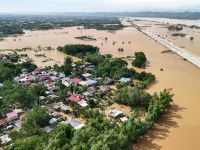The mystery surrounding Iran’s program of developing weapons of mass destruction has intensified even more so following U.S. President George W. Bush’s State of the Union speech some two weeks ago. Bush claimed Iran, along with Iraq and North Korea form an “axis of evil”, developing weapons of mass destruction and posing a threat to world security and order.
According to a Pakistani daily, Bruno Tertrais, a researcher at the Paris-based Foundation for Strategic Research and one of the leading experts on the Iranian nuclear program, says that the Islamic Republic of Iran will be able to develop its own bomb in five to ten years, and only if it really decides it wants to have one.
Dawn reports that the viewpoint presented by the author in L'Asie Nucleaire, published by the French Institute for International Relations, the country's leading think tank on foreign relations, contradicts the assessment recently made in Washington by Israeli Defense Minister Benjamin Ben Eliezer, who claimed that if Iran does not already have such a bomb, it will do so "between now and 2005."
"It's no secret," conveys Tertrais, "that Iran established a military nuclear program many years ago." According to his assessments, however, "it will be capable of having a bomb anywhere between five and ten years, that is if it really wants to have one, which isn't necessarily the same thing."
Tertrais also emphasized that the decision by Tehran to have its own nuclear capability is nothing new and has existed long before the accession to power of Ayatollah Khomeini in 1979. This week marks the 23rd anniversary of Iran's Islamic revolution, when Shiite Muslim fundamentalists overthrew a U.S.-backed regime headed by the late Shah Mohammad Reza Pahlavi.
"Indeed Iran's nuclear program is largely the doing of France and goes back to the early 1970s, when the Shah convinced French authorities that it was to their advantage to sell to Iran the necessary technology, that Iran might otherwise obtain from Washington”, according to Tertrais.
"As it turned out," he continues, "France decided to sell to Iran five nuclear plants in 1974," although the cooperation eventually came to an end, especially following Ayatollah Khomeini’s rise to power.
“Today”, adds Tertrais, “it is Russia and China who are assisting Iran in developing a civilian nuclear capacity, although they obviously realize that part of the technological expertise they are providing can be used in a military nuclear program.”
If Iran indeed has chosen to provide itself with the bomb, which is highly likely according to Tertrais’ estimations, "then it will be entirely with a view to protecting its territory, not only from Washington and Israel, perceived by Tehran as wanting to become the dominant power in the region, but perhaps more so from Iraq," which is also considered as either possessing a nuclear device already, or, like its neighboring Iran, is capable of developing one if it chooses eventually to have a bomb."
With regards to American and Israeli charges that an Iranian bomb would be the same thing as an Islamic bomb and would be used, for example, in support of Palestine, Tertrais strongly stressed that, in the case of Iran, "that an Islamic country has the bomb doesn't necessarily mean that it has an Islamic bomb, indeed it doesn't mean either that it's more dangerous in its hands than if it is in the hands of any other country."
"If ever Iran does choose to go ahead and give itself a nuclear device," claims Tertrais, "then chances are it will be a Persian bomb much more than an Islamic bomb." (Albawaba.com)
© 2002 Al Bawaba (www.albawaba.com)







